|
|
|
Sort Order |
|
|
|
Items / Page
|
|
|
|
|
|
|
| Srl | Item |
| 1 |
ID:
162759


|
|
|
|
|
| Summary/Abstract |
The “big tent” mission of the Journal of Global Security Studies is well illustrated by this issue, as our first four articles explore issues from ontological security to cyber secrecy to sexual torture to traditional analyses of compellent threats. The next three articles illustrate the value of conversation between different parts of the field in their juxtaposition of arms control, humanitarianism, and empire; security governance and domestic politics; and reflexivity about casual claims in the study of ethnic conflict. Our final article, a research innovation, issues a critique of a well-respected network dataset.
|
|
|
|
|
|
|
|
|
|
|
|
|
|
|
|
| 2 |
ID:
156238


|
|
|
|
|
| Summary/Abstract |
The research articles in this issue demonstrate different approaches to creative research in security studies. Our first article by Kathryn Alexander demonstrates the value of bringing insights from one field to another. She draws on findings from American politics on the importance of religiosity for policy attitudes to extrapolate an argument about state bellicosity relevant to international security. Building on Americanists’ arguments, she infers that states with greater proportions of highly religious people can project a more aggressive foreign policy.
|
|
|
|
|
|
|
|
|
|
|
|
|
|
|
|
| 3 |
ID:
171796


|
|
|
| 4 |
ID:
157847
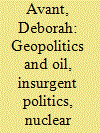

|
|
|
|
|
| Summary/Abstract |
This issue launches the third volume of the Journal of Global Security Studies. It begins with an article by Cullen Hendrix arguing that geopolitics conditioned the oil curse. Particularly, he claims that the negative impact oil production has on a country's democratic tendencies is less a timeless result of market dynamics and more a particular consequence of geopolitics in the transition from the Cold War. His reanalysis of data and case examinations of Azerbaijan and Georgia provide compelling evidence supporting both the magnitude of oil's post–Cold War effect and the logic of his claims.
|
|
|
|
|
|
|
|
|
|
|
|
|
|
|
|
| 5 |
ID:
075281


|
|
|
|
|
| Publication |
2006.
|
| Summary/Abstract |
Over the course of the last fifteen years states-along with companies, international organizations, non-governmental organizations, and others-have increasingly turned to markets rather than state-organized military hierarchies for security. This article puts forth hypotheses about how this marketization might affect three major literatures in international relations theory: the democratic peace, late state building, and theories of the frequency and nature of conflict. Relying on institutional logic, I argue that the marketization of security should redistribute power over the control of force. This redistribution should cause democracies to function differently-increasing the dilemmas between short-term security and long-term relations with other democracies. It should also reinforce the dilemmas pointed to by the literature on the resource curse and rentier states, thus deepening the expected difficulty of state building. Finally, as more states and non-state actors take advantage of market options for security, the oft-assumed collective monopoly of states over violence should suffer a blow. This should lead the chances for conflict to grow but also the purposes for which people and groups use violence to change. These propositions are not tested but serve as a call for further research.
|
|
|
|
|
|
|
|
|
|
|
|
|
|
|
|
| 6 |
ID:
160472
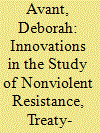

|
|
|
|
|
| Summary/Abstract |
The third issue of JoGSS’ third volume opens with a special, guest-edited section introducing new ways to explore nonviolent resistance—a form of conflict in which unarmed persons use a wide variety of coordinated tactics to push for change without harming others. As Braithwaite and Braithwaite note in their introduction to the special section, the quantitative study of nonviolent resistance has recently become much more prominent in the field. They curated for this issue a series of new studies that disaggregate actors and tactics to uncover new insights regarding the role of ethnic power relations on the participant bases of nonviolent and violent resistance campaigns, the role of fear of victimization in patterns of mobilization, the effects of state response in protest dynamics, the role of national trade unions in the duration and outcomes of nonviolent campaigns, and the role of the United Nations in the diffusion of norms of nonviolence across secessionist movements.
|
|
|
|
|
|
|
|
|
|
|
|
|
|
|
|
| 7 |
ID:
052521


|
|
|
|
|
| Publication |
Jul-Aug 2004.
|
|
|
|
|
|
|
|
|
|
|
|
|
|
|
|
| 8 |
ID:
077387
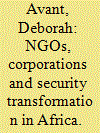

|
|
|
|
|
| Publication |
2007.
|
| Summary/Abstract |
Transnational non-state actors interested in maintaining a presence in parts of the world where the state is weak are an important part of the privatization of security that has not been well analyzed. In this article I lay out propositions about how an increasing role for non-state actors in security may transform the conceptualization of security and the use of violence more generally. I argue that international NGOs and transnational corporations conceptualize security and how to achieve it differently than states have traditionally done and that these differences have potential consequences for which problems are addressed, as well as for whether and how violence is used in the communities where they operate
|
|
|
|
|
|
|
|
|
|
|
|
|
|
|
|
| 9 |
ID:
150479
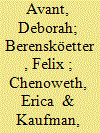

|
|
|
|
|
| Summary/Abstract |
The final issue of JoGSS’ first volume begins with paired articles on piracy and ends with a forum on censorship. These bracket an innovative argument about the importance of first impressions for threat perception and a careful empirical analysis of why support for the draft in the United States has waned. The articles in this issue showcase a wide variety of methods, many different theoretical starting points, and engage both contemporary and historical issues.
|
|
|
|
|
|
|
|
|
|
|
|
|
|
|
|
| 10 |
ID:
097370
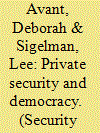

|
|
|
|
|
| Publication |
2010.
|
| Summary/Abstract |
Arguments about the importance of democracy for international behavior assume that states rely on military organizations rather than "hired guns." With the growth of the private security market this assumption no longer holds true. Focusing on the United States, we use original data to compare the impacts of using private military/security forces and military forces on attributes identified as endemic to democracies: constitutionalism, transparency, and public consent. Our evidence indicates that forces raised via contract are harder to learn about and thus less transparent than military forces. Largely due to lowered transparency, Congress has a harder time exercising its constitutional role, which impedes constitutionalism. Finally, though the public is just as sensitive to the deaths of private forces as it is to military deaths, it is less likely to know about them. Thus the lack of transparency also circumvents meaningful public consent. We conclude with a consideration of the potential implications of these changes for U.S. foreign policy.
|
|
|
|
|
|
|
|
|
|
|
|
|
|
|
|
| 11 |
ID:
116128
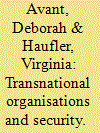

|
|
|
|
|
| Publication |
2012.
|
| Summary/Abstract |
The fields of international relations and criminology analyse security from different directions, but both have had a dominant focus on states and state agencies until recently. Even as they looked at a wider range of actors as security providers, an important category of security actors has not been analysed so far - 'non-violent' transnational organisations. Transnational non-governmental organisations (NGOs) and transnational corporations (TNCs) are not security organisations per se, but the strategies these transnational non-state actors pursue in response to violence affect security for both themselves and the societies in which they operate. We argue here that security at the local level is an outcome of interactions among diverse actors including transnational organisations and call for a research agenda focused on how transnational actors choose their response to insecurity and how those choices affect security governance.
|
|
|
|
|
|
|
|
|
|
|
|
|
|
|
|
|
|
|
|
|